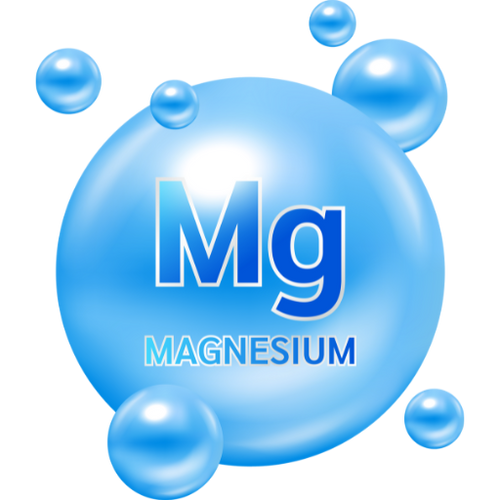Guide to Magnesium: Forms, Benefits, and Uses
Magnesium is one of the most essential minerals for your health, playing a key role in energy production, brain function, and muscle recovery. However, there isn’t just one type of magnesium. Various forms exist, each serving specific purposes based on how they are absorbed and used by the body. Here’s everything you need to know about the different types of magnesium, their uses, ideal dosages, benefits, and drawbacks.
Here's my QUICKGUIDE to MAGNESIUM
Magnesium Citrate: digestive problems, muscle cramps and relaxation.
Magnesium Glycinate: improve sleep, reduce stress and mood balance and menstrual pain.
Magnesium Oxide: not considered by BestlifeNZ as a suitable form for supplementation - so be aware.
Magnesium Malate: improves ATP production and energy levels
Magnesium Threonate: memory and cognitive function and decline.
Magnesium Chloride: best taken topically in creams or bath salts to sooth muscle pain or stiffness
Magnesium Sulfate (bath salts): disolve in water to relieve muscle cramps, tension and stress.
Magnesium Taurate: regulate blood pressure, support heart function, and reduce stress on the nervous system.
Magnesium Orotate: used by athletes to improve endurance, recovery, and overall performance.
Magnesium Citrate
Magnesium citrate is formed when magnesium combines with citric acid, a compound naturally found in citrus fruits. This form of magnesium is highly bioavailable, meaning it is easily absorbed by the body. It is particularly effective for relieving occasional constipation due to its ability to draw water into the intestines, promoting healthy bowel movements. Magnesium citrate also supports muscle relaxation, making it a go-to choice for individuals dealing with muscle cramps.
This type of magnesium is ideal for those experiencing digestive irregularity, mild magnesium deficiency, or muscle tightness. A typical dose ranges from 200 to 400 milligrams per day. For digestive support, it is best taken in the morning on an empty stomach, while for relaxation, taking it in the evening can help calm the body. While effective, high doses may cause loose stools, so it’s important to adjust based on individual tolerance.
Magnesium Glycinate
Magnesium glycinate is a combination of magnesium and glycine, an amino acid known for its calming properties. It is gentle on the stomach, making it a great option for individuals with sensitive digestion. This form of magnesium is renowned for its ability to promote relaxation, improve sleep quality, and reduce symptoms of stress and anxiety. It also supports mood balance and alleviates premenstrual syndrome (PMS) symptoms.
Magnesium glycinate is best suited for people dealing with stress, insomnia, or mood imbalances. A dose of 300 to 400 milligrams per day is often sufficient. Taking it in the evening is most effective as it helps the body prepare for restful sleep. It pairs well with Vitamin B6 and zinc for enhanced mood regulation but does not provide significant digestive benefits like other forms of magnesium.
Magnesium Oxide
Magnesium oxide is a naturally occurring form of magnesium that is widely available and affordable. It is commonly used as a laxative due to its ability to stimulate bowel movements. While magnesium oxide is effective for occasional constipation relief, its bioavailability is very low—only about 4% of the magnesium is absorbed by the body. For this reason, it is not ideal for addressing magnesium deficiency.
This type of magnesium is best used as a short-term solution for constipation. A dose of 250 to 500 milligrams per day is typically recommended. It should be taken in the morning with plenty of water to maximize its laxative effect. However, magnesium oxide is not suitable for individuals who need long-term magnesium supplementation for other health concerns.
Magnesium Malate
Magnesium malate is a compound formed by combining magnesium with malic acid, a naturally occurring substance found in fruits like apples. This form of magnesium supports energy production by aiding ATP synthesis, which fuels your cells. It is particularly helpful for individuals suffering from chronic fatigue or fibromyalgia, as it can reduce muscle pain and improve energy levels.
Magnesium malate is ideal for athletes or individuals dealing with low energy. A daily dose of 300 to 600 milligrams is recommended, and it is best taken in the morning or early afternoon to support energy levels throughout the day. While generally well-tolerated, some individuals may experience mild digestive discomfort when taking magnesium malate.
Magnesium L-Threonate
Magnesium L-threonate is a unique form of magnesium bound to threonic acid, a derivative of Vitamin C. It is one of the few forms of magnesium capable of crossing the blood-brain barrier, making it particularly effective for improving brain function, memory, and cognitive clarity. Research suggests that magnesium L-threonate can support individuals dealing with brain fog or age-related cognitive decline.
This form of magnesium is perfect for individuals seeking enhanced cognitive performance or improved mental clarity. A dose of 1,000 to 2,000 milligrams per day, divided into two doses, is usually recommended. It is most effective when taken in the morning and afternoon to sustain focus and cognitive function throughout the day. Magnesium L-threonate is highly effective but more expensive compared to other forms of magnesium.
Magnesium Chloride
Magnesium chloride is a versatile form of magnesium often derived from seawater. It is well absorbed by the body and can be taken orally or applied topically in the form of magnesium oil. This makes it a popular choice for individuals who prefer to absorb magnesium through the skin. Magnesium chloride provides general magnesium support and helps ease muscle tightness when used in baths or lotions.
For oral supplementation, a dose of 300 to 400 milligrams per day is recommended. Topical applications, such as magnesium oil, can be used daily to soothe muscle tension or soreness. Magnesium chloride works particularly well when paired with Epsom salt baths for ultimate relaxation. Some individuals may find the taste of oral magnesium chloride unpleasant, and high doses can cause mild digestive discomfort.
Magnesium Sulfate (Epsom Salt)
Magnesium sulfate, better known as Epsom salt, is commonly used in warm baths to promote relaxation and reduce muscle soreness. It is highly effective as a topical remedy for muscle cramps, tension, and stress relief. While Epsom salt can be consumed orally, it has very poor bioavailability and is not an ideal choice for addressing magnesium deficiency.
For muscle relaxation and stress relief, dissolve one to two cups of Epsom salt in warm water and soak for 20 to 30 minutes. It is best used in the evening to relax the body and improve sleep.
Magnesium Taurate
Magnesium taurate combines magnesium with taurine, an amino acid known for its role in cardiovascular health. This form of magnesium helps regulate blood pressure, support heart function, and reduce stress on the nervous system. It is an excellent choice for individuals focusing on heart health or managing high blood pressure.
A dose of 300 to 400 milligrams per day is recommended, and it is best taken in the evening to support relaxation. Magnesium taurate is compatible with potassium and CoQ10 for comprehensive cardiovascular support but is less widely available and often more expensive than other forms of magnesium.
Magnesium Orotate
Magnesium orotate combines magnesium with orotic acid, which supports cardiovascular health and cellular energy production. It is commonly used by athletes and individuals with heart health concerns to improve endurance, recovery, and overall performance.
A typical dose ranges between 300 and 400 milligrams per day, and it is best taken in the morning to promote energy and cellular repair. Magnesium orotate is one of the most expensive forms of magnesium, but it is ideal for those needing targeted cardiovascular support.
Final Thoughts
Choosing the right form of magnesium depends on your specific health goals. From digestive health to stress relief and brain function, each type of magnesium offers unique benefits. Always consult a healthcare professional to determine the best dose and form for your individual needs.




Leave a comment
All comments are moderated before being published.
This site is protected by hCaptcha and the hCaptcha Privacy Policy and Terms of Service apply.